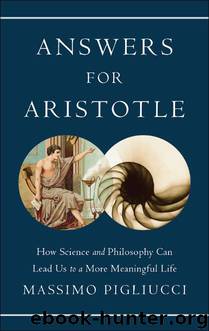Answers for Aristotle by Massimo Pigliucci

Author:Massimo Pigliucci
Language: eng
Format: mobi, epub
ISBN: 9780465032808
Publisher: Basic Books
Published: 2013-01-06T11:05:36+00:00
PART IV
LOVE AND FRIENDSHIP
CHAPTER 11
THE HORMONES OF LOVE
You can’t blame gravity for falling in love.
—ALBERT EINSTEIN
THE GOD OF LOVE LIVES IN A STATE OF NEED, WROTE Plato in the Symposium, a dialogue on the various forms of love in which we get sex advice from none other than Socrates! Philosophers, and of course novelists and poets, have been writing about love for millennia for the simple reason that it is a fundamental emotion that profoundly affects our lives. But precisely because love is a universal phenomenon in our species, one may wonder about its evolutionary origins, and because it is an emotion, we can also ask what mechanisms in our brain make it possible. And those questions lead us into the still young and already controversial science of love.
How can anybody seriously entertain the thought of putting such a complex human emotion as love under the scientist’s microscope without ending up looking ridiculous, or at any rate missing the essence of what is going on? For starters, we can use smelly T-shirts. In 1995 Claus Wedekind and his collaborators at the University of Bern in Switzerland published a now-famous paper in the prestigious Proceedings of the Royal Society in which they claimed that human females display clear preferences for males who smell a certain way. The researchers followed a simple protocol: they told a number of men to wear the same T-shirt for a couple of nights; then they asked a group of women to smell the shirts and rate the odors they perceived for sexual attractiveness. This sounds like a bunch of crazy scientists run amok, but there was a logic to the experiment: Wedekind and his colleagues knew that other mammals (for instance, mice) express olfactory preferences for potential mates, and that the reason for this is that an individual’s smell is related to the genes he carries at the major histocompatibility complex (MHC)—an important molecular tool of the immune response system through which our bodies defend themselves from external attack by pathogens.
So the Swiss scientists scored both the men and women in their experiment for their MHC molecular markers and then compared the data with the women’s preferences based on the smell of the T-shirts. The results were astounding: humans behave like mice, with the females demonstrating a significantly stronger preference for males who sport MHC genes different from their own. This makes perfect sense from an evolutionary perspective, because when people with different MHC genes mate, their offspring will have more genetic variants at their own major histocompatibility complex, which in turn increases the chances of that offspring surviving an infection. (It’s like having a wider array of defense weapons at your disposal: if the enemy disables one kind, you can always deploy another one.)
This is an intriguing example of how an evolutionary prediction (parents should try to maximize genetic variation in the immune response of their offspring), already borne out in the case of animal systems (mice), turns out to predict the behavior of otherwise much more complex organisms such as ourselves.
Download
This site does not store any files on its server. We only index and link to content provided by other sites. Please contact the content providers to delete copyright contents if any and email us, we'll remove relevant links or contents immediately.
The remains of the day by Kazuo Ishiguro(8961)
Tools of Titans by Timothy Ferriss(8357)
Giovanni's Room by James Baldwin(7313)
The Black Swan by Nassim Nicholas Taleb(7097)
Inner Engineering: A Yogi's Guide to Joy by Sadhguru(6780)
The Way of Zen by Alan W. Watts(6589)
Asking the Right Questions: A Guide to Critical Thinking by M. Neil Browne & Stuart M. Keeley(5747)
The Power of Now: A Guide to Spiritual Enlightenment by Eckhart Tolle(5740)
The Six Wives Of Henry VIII (WOMEN IN HISTORY) by Fraser Antonia(5493)
Astrophysics for People in a Hurry by Neil DeGrasse Tyson(5172)
Housekeeping by Marilynne Robinson(4432)
12 Rules for Life by Jordan B. Peterson(4298)
Double Down (Diary of a Wimpy Kid Book 11) by Jeff Kinney(4257)
The Ethical Slut by Janet W. Hardy(4235)
Skin in the Game by Nassim Nicholas Taleb(4231)
Ikigai by Héctor García & Francesc Miralles(4228)
The Art of Happiness by The Dalai Lama(4118)
Skin in the Game: Hidden Asymmetries in Daily Life by Nassim Nicholas Taleb(3985)
Walking by Henry David Thoreau(3948)
